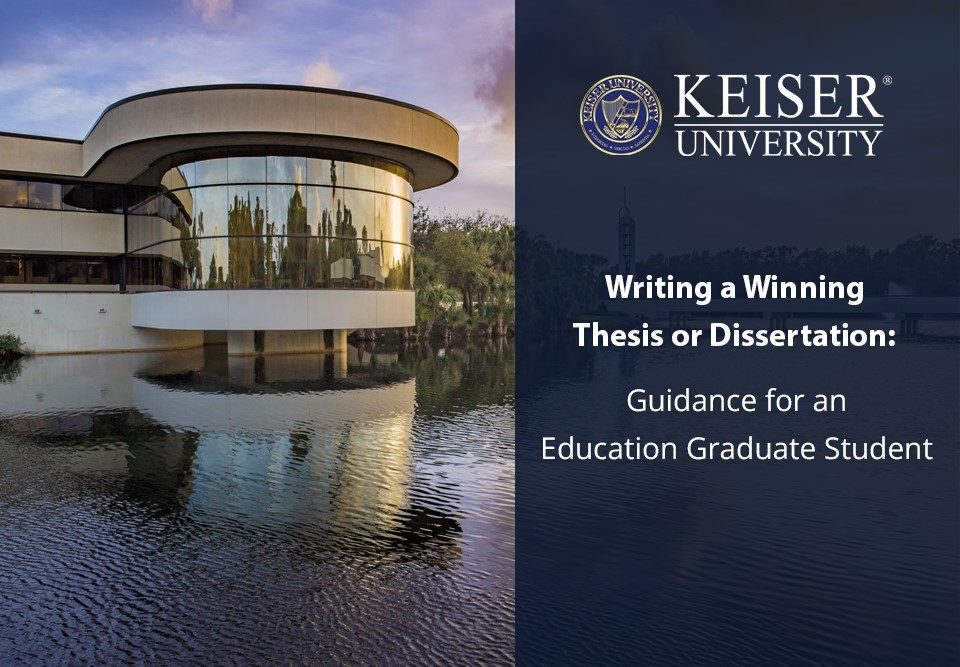Whether you’re thinking about pursuing an advanced degree in education or are already in such a program, one thing you will need to be prepared for is writing a thesis or dissertation. In most graduate-level education programs, a thesis or dissertation is the culmination of years of challenging work, serving as your own independent research that marks the final step before earning your graduate degree.
If writing a dissertation or thesis sounds like a daunting task, it does not have to be. With a little preparation and some best practices in mind, you can approach writing a thesis or dissertation with confidence.
Understanding the Thesis and Dissertation Process
Before writing a thesis or dissertation, it’s important to understand their general scope and purpose, along with some key differences between a thesis and a dissertation. After all, while there are some similarities between the two, a dissertation and a thesis are not the same thing.
Defining the Scope and Purpose
The primary purpose of a thesis or dissertation in an education graduate program is for students to demonstrate what they have learned in their respective programs while applying their own research, theory, analysis and synthesis. Ultimately, the author of a thesis or dissertation should successfully contribute something new to the existing topic. In dissertations specifically, students may also be required to articulate, discuss and defend their research orally in front of professors or other faculty members. This oral defense is not required for a master’s thesis.
Differences Between Thesis and Dissertation
When it comes to writing a thesis or a dissertation, the terms “dissertation” and “thesis” are sometimes used interchangeably. That said, it is crucial to understand that these are two different things. Generally, a dissertation is primarily focused on filling a gap in existing literature or extending upon current research regarding a specific topic. The goal is to analyze literature to the point of saturation and determine where there is a need for further research. In a dissertation, a doctoral student will then explain where the problem exists given current research and develop a research study to explore or evaluate the problem, thus filling the gap and contributing meaningfully to the field.
On the other hand, a thesis is more of a presentation of information that’s already out there with no obligation to conduct additional research.
Choosing the Right Topic
One of the most important aspects of drafting a great thesis or dissertation begins with choosing the right topic. Here, it is paramount to select a topic that not only interests you but is relevant to your future professional goals and aspirations. After all, there’s a good chance you may use your thesis or dissertation as a basis for future work or further research.
Considering Current Research Trends
In selecting a topic, you will also want to consider current research trends in your field. What is trending in the realm of education and what could you contribute to existing research? There are research gaps or questions that remain unanswered about certain educational topics that could be addressed through your research.
Research and Proposal Development
In most graduate programs, you will need to write and present a research proposal before you can really get started on your thesis or dissertation. Most research proposals are reviewed and approved by a professor or other faculty.
Conducting a Literature Review
A literature review is to discover the research available on your research topic. This review should detail each source you plan to use in your own research with plenty of detail. More specifically, a literature review is a comprehensive summary of the current literature on a given topic that demonstrates the need for additional research to be conducted. Literature reviews comprise a major portion of a proposal, including a summary of each source as it relates to the need for additional research.
Finding Reliable Sources
Quality is vital when it comes to selecting literature for your research or literature review. Ideally, your literature review should include plenty of recent and reputable sources that come from academic journals, books, articles and even other dissertations.
Developing a Research Proposal
Once you have a better understanding for what is already out there, you can craft a research proposal that discusses your specific research topic, the current problem, the purpose behind your research, the methodology you plan to use and the relevant literature that further defends a need for your topic to be investigated.
Methodology Selection
An important part of your research proposal will be your methodology selection, which will explain exactly how you plan to go about your research. For example, will your research be qualitative, quantitative or a mix of both and why? How will the methodology you choose answer your research questions?
Writing and Structuring Your Thesis or Dissertation
After your research proposal is approved, you will have the green light to begin working on your thesis or dissertation. You will receive feedback or thesis guidance from the faculty member who reviewed your proposal. It is important to reflect on the feedback and make revisions as needed.
Creating an Outline
One of the most helpful things you can do as you get started with your dissertation or thesis is to create an outline. This allows you to develop the most critical aspects of your final project that include your thesis, your main points and other key details to ensure that they flow logically.
For reference, an outline for a dissertation will typically include the following:
- Introduction of existing research
- Review of literature
- Conceptual framework
- Methodology
- Results or findings
- Interpretations, conclusions or recommendations for future research
Structuring Arguments
In creating an outline, include designated sections for each of your main points with specific research, statistics, or other data to support it. This will ensure that your arguments are made clearly and that your thought process is clear.
Writing Tips and Strategies
Even if writing is not necessarily your strong suit, you will need to be able to put together a cohesive document for your thesis or dissertation. There are some basic strategies worth keeping in mind to help you get started.
First, it can be helpful to write your introduction and conclusion paragraphs last once you have completed all your research. While it might seem counterintuitive to do it this way, it can help set the tone for the rest of your writing. Likewise, this strategy ensures that you include your main points while preparing your readers for the information to come.
Additionally, meet with your advisor or faculty sponsor regularly to gain valuable feedback and keep your project on track.
Data Collection and Analysis
Whether you are writing a thesis or dissertation, you will need to do a fair amount of your own qualitative or quantitative research. It’s important to understand the various data collection methods available to you, plus the best practices for analyzing and interpreting data.
Choosing Data Collection Methods
There are two main types of data collection:
- Quantitative data - Refers to hard data that is numerical in nature, such as statistics and percentages.
- Qualitative data - Refers to information that is non-numerical, such as interviews and focus groups.
- Mixed methods – Refer to a combination of both quantitative and qualitative data.
Analyzing and Interpreting Data
Once you have all the data you need to write your thesis or dissertation, the challenging part is often analyzing and interpreting the data to apply to your own research. The most important thing to keep in mind when looking at hard data is how it relates back to your research and specific research questions.
When working with quantitative data, it can also be helpful to look for specific trends and correlations that you can share in your research.
Reviewing and Editing Your Work
Once you have completed the first draft of your thesis or dissertation, the process of reviewing, revising and editing your work before submission is important to ensure that the document is free of errors and that it effectively communicates your main points to the reader.
Peer Review and Feedback
One of the best ways to improve upon the first draft of your dissertation or thesis is through peer review and feedback. By having others read your draft and provide feedback, you can gain some valuable insights into how your arguments are being interpreted. Even if the person you ask to read your draft is not familiar with the subject matter, they can still provide useful feedback on the organization of the information, structure and grammar/spelling.
Proofreading and Final Edits
It may take several rounds of revisions before your dissertation or thesis is approved. Even when you feel like the entire thing is ready to submit, it is important to complete another round of proofreading and editing to be sure that the entire document is polished and in the best shape possible. This includes not just running a basic spell check but taking the time to read your paper word for word.
Formatting Guidelines
In most education programs, you will be instructed to use the American Psychological Association (APA) style when writing and formatting your thesis or dissertation. It is important to follow all formatting guidelines here, especially as they relate to citations or references.
Preparing for the Defense
In many doctorate programs and some graduate programs, students will also be expected to defend their dissertations in front of other scholars, usually professors or other faculty from the department. This process can be daunting, even for those who know their research well and have crafted thoughtful dissertations.
Crafting Your Presentation
In preparing for a dissertation defense, it is imperative to craft a presentation that covers the basics of your dissertation topic, how you researched it and what your findings were. Following your presentation, you can expect to be asked questions by those in attendance about your topic and other aspects of your research.
Practicing Your Defense
The best way to prepare for a dissertation defense is to practice as much as possible. This way, you will be prepared for the kinds of questions that may be asked, and you will feel a little more confident when completing your defense.
Mock Sessions
Mock defense sessions can be especially helpful for practicing your presentation and answering questions from a real crowd. Do not hesitate to ask your fellow students or even some trusted professors to practice with you to provide feedback or ask questions.
Handling Questions
One of the most difficult aspects of defending a dissertation is often answering questions from the audience. One important tip to keep in mind here is to prepare some answers in advance to some of the questions you think might be asked during your dissertation defense. This way, you will be completely prepared to knock these out of the park.
Ready to Pursue an Advanced Degree?
As you can see, there is a lot that goes into writing a dissertation or thesis as part of your graduate education program. With this dissertation guidance in mind, you will be prepared to craft and even defend your thesis or dissertation with success.
Still looking for the right graduate education program to suit your interests and professional goals? Keiser University is proud to offer a number of advanced degrees in education, including our Master of Science in Education, Teaching and Learning program. If you’re interested in earning your doctorate degree, we also offer a Doctor of Education and a Doctor of Philosophy in Educational Leadership.
Learn more about any of the graduate programs offered at Keiser University by contacting a graduate admissions counselor today, or get started with your online application for enrollment.






 The instructors at Keiser University impacted my life. They believed in my ability to become a great graphic designer, regardless of how I felt about my skills. KU helped to prepare me for the real world and got me to where I am today.
The instructors at Keiser University impacted my life. They believed in my ability to become a great graphic designer, regardless of how I felt about my skills. KU helped to prepare me for the real world and got me to where I am today.
